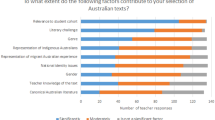Abstract
This chapter offers a reflection on two collaborative research studies in which preservice and practicing teachers developed frames of reference for critically analyzing multicultural and postcolonial rhetoric, curricula, texts and activities and attempted to bring these new understandings to their classroom practice. We focus on the tensions that emerged between these teachers’ professed beliefs about teaching diverse literatures and their classroom practices, and ways in which these tensions offered possibilities for developing new reading and teaching practices.
Access this chapter
Tax calculation will be finalised at checkout
Purchases are for personal use only
Preview
Unable to display preview. Download preview PDF.
Similar content being viewed by others
References
Ashcroft, B., G. Griffiths & Helen T. (2002). Key Concepts in Post-Colonial Studies. New York: Routledge.
Ashcroft, B., G. Griffiths & Helen T. (Eds.) (1988). “Introduction.” Key Concepts in Post-Colonial tudies pp. 1–3. New York: Routledge.
Banks, J. (1989). Multicultural Education: Issues and Perspectives. Boston: Allyn and Bacon.
Bissoondath, N. (1998). “No Place like Home: … the Cracks in Canada's Multicultural Mosaic.” New Internationalist, (305), September.
Britzman D. (1991). “Decentering Discourses in Teacher Education: Or, The Unleashing of Unpopular Things,” Journal of Education, 173(3), pp. 75.
Bruised Head, S. (1987). “An Afternoon in Bright Sunlight.” In J. Rice & M. Hayhoe (Eds). Writing from Canada. pp.50–60. Cambridge, Cambridge University Press.
Carey-Webb, A. (1992). "Heart of Darkness, Tarzan, and the 'Third World'." Ibid, pp. 121–141
Choy, W. (1995). The Jade Peony. Toronto: Douglas and McIntyre.
Clarke, J. H. (1993). “The Boy Who Painted Christ Black.” In Black American Short Stories. J. H. Clarke (Ed). New York: Hill & Wang.
Cochran-Smith, M. (2004). Walking the Road: Race, Diversity and Social Justice in Teacher Education. New York: Teachers College Press.
Cochran-Smith, M. (1995). Uncertain Allies: Understanding the Boundaries of Race and Teaching. Harvard Educational Review, Vol. 65(4), pp. 541–570.
Coetzee, J.M. (1999). Disgrace. London: Secker & Warburg.
Dimitriadis, G. & C. McCarthy. (2001) Reading and Teaching the Postcolonial: From Baldwin to asquiat and Beyond New York & London: Teachers College Press.
Delpit, L. (1994) Other People’s Children. New York: Routledge.
Ferré, R. (1993). “The Youngest Doll.” In A. Applebee & Suzanne L. (Eds.), Multicultural Experiences. pp. 274–280. Evanston, Illinois: McDougall, Littell.
Goldblatt, P. F. (1998). “Experience and Acceptance of Postcolonial Literature in the High School nglish Classroom.” English Journal, November, pp. 71–77.
Hodges, G. (1990). “One Morning’s Reading of ‘An Afternoon in Bright Sunlight’.” In Eve B. and V. Watson, Where Texts and Children Meet, pp. 71–81. New York and London: Routledge.
hooks b. (1994). Teaching to Transgress: Education as the Practice of Freedom. New York: Routledge.
Hosseini, K. (2004). The Kite Runner. New York: Riverhead Books.
Jasper, G. (1998). “Multiculturally Challenged.” English Journal, November, pp. 93–97.
Jin, H. (2000). “A bad joke.” In The Bridegroom, pp. 142–148. New York: Vintage.
Johnston, I. (2006). “Engaged Differences: School Reading Practices, Postcolonial Literatures and their Discontents.” In Y. Kanu (Ed). Curriculum as Cultural Practice: Postcolonial Imaginations, pp. 116– 130. Toronto: University of Toronto Press.
Johnston, I. (2003a) Re-mapping Literary Worlds: Postcolonial Pedagogy in Practice. New York: Peter Lang.
Johnston, I. (2003b) “Reading and Resisting Silent Spaces of Whiteness.” In Wanda H. & E. Hase-Lubeke (Eds.), Curriculum Intertext, pp. 227–238. New York: Peter Lang.
Johnston, I. (2000). “Sites of Discovery and Discomfort: Reading and Teaching Multicultural Literature.” In B. Barrell & R. Hammett (Eds.), Advocating Change: Contemporary Issues in Subject English, pp. 136–146.Toronto: Irwin..
Lahiri, J. (1999). “The Third and Final Continent.” In Interpreter of Maladies, pp. 173–198. Boston: Houghton Mifflin.
Lee, H. (1960). To Kill a Mockingbird. New York: J.B. Lippincott & Co.
Mahfouz, N. (1995). “The Answer is No.” In Borovilos, J. (Ed.), Breaking free: A Cross-cultural Anthology. Toronto: Prentice Hall Canada.
Mahfouz, N. (1994). “Half a day.” In Something to declare: Selections from International Literature, pp. 3–6. Toronto: Oxford University Press.
Márquez, G. G. (1993). “ A Very Old Man with Enormous Wings.” In Arthur Applebee & Judith Langer (Eds.), Multicultural Experiences. Evanston, Illinois: McDougall, Littell.
Marx J. (2004). ”Postcolonial Literature and the Western Literary Canon.” In N. Lazarus (Ed.), The Cambridge Companion to Postcolonial Literary Studies, pp. 83–96. Cambridge: Cambridge University Press.
McCarthy, C, M.D. Giardina,& J._K. Park. (2003). “Afterword: Contesting Culture: Identity and Curriculum Dilemmas in the Age of Globalization, Postcolonialism, and Multiplicity.” Harvard Educational Review, 73(3), pp. 449–465.
Mishima, Y. (Tr. Ivan Morris). (1998). “Swaddling Clothes.” In The International Story. R. Spack (Ed.). pp. 132–135. Cambridge: Cambridge University Press.
Mukherjee, B. (1989). “The Management of Grief.” In The Middleman and Other Stories, pp. 179–197. Markham, ON: Penguin Books.
Montecinos, C, & D. L. Tidwell. (1996). “Teachers’ Choices for Infusing Multicultural Content: Assimilating Multicultural Practices into Schemata for Instruction in the Content Area.” In Francisco A. Rios (Ed.), Teacher Thinking in Cultural Contexts, pp. 210–238. Albany: State University of New York Press.
Naipaul, V. S. (1992). “B. Wordsworth.” In James, Barry & J. Griffin (Eds.), The storyteller: Short tories from around the world, pp. 145–151. Toronto: Nelson Canada.
Ricker-Wilson, C. (1998). “When the Mockingbird Becomes an Albatross: Reading and Resistance in the Language Arts Classroom.” English Journal, 87(3), pp. 67–72.
Robinson, E. (2000). Monkey Beach. Toronto: Alfred Knopf Canada.
Selvadurai S. (1997) Funny Boy. Toronto: Harvest Books.
Slemon, S. (2003). “ Afterword.” In Laura Moss (Ed.), Is Canada Postcolonial? Unsettling Canadian Literature, pp. 318–324. Waterloo, Ontario: Wilfred Laurier University Press.
Van Slyck, P. (1997). “Repositioning Ourselves in the Contact Zone.” College English, 59(2), pp. 149– 170. Wiebe, R. & Y. Johnson. (1998) Stolen Life: The Journey of a Cree Woman. Toronto: Vintage Canada.
Author information
Authors and Affiliations
Editor information
Editors and Affiliations
Rights and permissions
Copyright information
© 2012 Sense Publishers
About this chapter
Cite this chapter
Johnston, I., Mangat, J. (2012). Outside the Comfort Zone. In: Johnston, I., Mangat, J. (eds) Reading Practices, Postcolonial Literature, and Cultural Mediation in the Classroom. SensePublishers. https://doi.org/10.1007/978-94-6091-705-9_4
Download citation
DOI: https://doi.org/10.1007/978-94-6091-705-9_4
Publisher Name: SensePublishers
Online ISBN: 978-94-6091-705-9
eBook Packages: Humanities, Social Sciences and LawEducation (R0)





